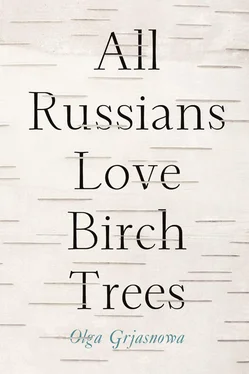From my booth I observed the room. Only three people were listening to the Russian channel. That calmed me down a little bit and I returned my attention to the speaker, watching him gesticulating on the video screen.
I was supposed to interpret the opening address of the French cultural attaché before the first coffee break as well as the initial part of a talk by a professor emeritus on Jewish identity in French literature after 1990.
When the attaché began speaking my heartbeat accelerated. I was convinced my three listeners would hear it as well. But the attaché spoke slowly and used the first fifteen minutes to welcome the majority of the audience by name. Afterward, he read out the names of the speakers and the titles of their talks. Both were also displayed on a second video screen. When he started talking about the purpose of this conference my booth colleague tapped me and took over. I felt like I’d just been fucked over.
Half an hour later, I got to take over again. The attaché was still talking, slowly and deliberately, interspersing jokes that I translated quite freely into Russian. My listeners smiled. The speech was not very challenging and I interpreted at a suitable pace. My boss’s face relaxed. When polite applause for the speaker set in, he even left me alone in the booth for a minute. The professor, on the other hand, didn’t make life easy for me. Despite the fact that the subject of his talk was contemporary literature, his choice of words was antiquated. And he delivered the speech at a breakneck pace.
The air in the booth grew increasingly stuffy. Suddenly I was an entire sentence behind and my colleague kept writing technical terms on his pad and pushing them toward me. But all I needed was a short pause — as my speaker cleared his throat I spoke even faster into the microphone and caught up.
After the coffee break had been announced we both exhaled. The head of booth even smiled at me and asked in French, “Where did you study?”
“In Germany.”
“Not bad at all. You’ll definitely get there.”
Then he went off to the dining hall and I locked myself in a bathroom stall for the entirety of the lunch break.
When I got home that night, I was dead tired. Paralyzed with exhaustion. The candle in front of Elisha’s photo had burned down. The concrete mixer outside was still running.
My mother had left a message on the answering machine. They’d gone to the cemetery and had placed a stone on the grave for me. I should call her back. That day Elisha’s death had become something final — a fact that left no room for hope.
In Germany the season had long ago turned into fall, but here the summer heat prevailed. The dried bodies of cockroaches piled up in the hallway. The days melted into one another. The weekends and holidays I spent at the beach or visiting boutiques. I almost never bought anything and only occasionally let a shop assistant talk me into trying on a dress. On Frishman Street I found a shop that carried old clothes from Berlin. Refashioned. Israeli-style. In general, everyone loved Berlin that summer. Most had already been and couldn’t wait to go back.
I would visit Ori in his workshop in the south of Tel Aviv. The noise and intensity of the city concentrated there. Refugees from Sudan, nurses from the Philippines, artists, students — they all lived in Florentin. Ori was a cabinetmaker who channeled his love of wood into big, heavy pieces of furniture. We often sat on the stoop of his workshop, with watermelons and cold beer. Sometimes, the owner of the upholstery shop joined us. The entire street was filled with furniture makers. And our favorite bar, Hoodna, wasn’t far either.
It was only my fabricated worries that distracted me. I feared that Tal would get into an accident, imagined her crashing head-on into a truck. Her motorcycle under the rear end and her ribcage smashed. Or she could fall in her entryway, or get attacked and robbed. A serial killer could sneak up on her and plunge a knife into her back. Tal would slowly bleed to death. Her hands twitching. A pool of blood spreading around her. Most of all, I was afraid that something would happen to her at one of the protests, that she would get hit by a stray bullet or crushed by a tank. There were so many possibilities. I toyed with the idea of anonymously reporting her to the police. On the grounds of her political activism, for example. At least she’d be safe in prison.
I called her.
“Are you OK?”
“Yes,” she responded, bored.
“Why are you breathing so heavily?”
“I’m not.”
“OK.”
“Masha, is anything wrong?”
“No.”
“OK. I’m at work. I can’t talk right now.”
“OK.”
“I’m hanging up then.”
“Don’t drive so fast,” I said.
“I’m not driving. I’m at work.”
“But later, you will. When you go home.”
“You’re not my mother.”
“I’m just worried.”
Tal let out an exasperated sigh.
“I was in the West Bank. One trip home won’t kill me.”
“Statistically, more people here die in traffic accidents than in terrorist attacks.”
“You’re sick.”
She hung up. I couldn’t understand how I had become so dependent on her so quickly. Mostly I just called to make sure she was still breathing. I would call, waiting for her to answer and hanging up with her first breath. When she called back I didn’t respond. Said my phone was messing up. The key lock. Not my fault. Tal gave me a new phone.
A hot, dry chamsin blew in and brought nothing good. The air was stuffy and I felt the taste of dust on my skin and lips. Ori had asked me to drive him to a meeting point in the Negev. We would take his car and I could bring it back to Tel Aviv and use it for the next three weeks. Or drive out to Sinai for a nice trip. He presented these options like a salesman laying out his goods, although I’d said yes right away. He sounded so exhausted and depressed that I didn’t have a choice.
He was waiting for me in front of his house, wearing a khaki military uniform, a machine gun slung over his shoulder. Seeing him made me sick. My thoughts immediately turned to Farid, who hadn’t come back either. Suddenly I remembered what he had looked like: a gangly boy with a gap between his front teeth. I saw him descending the stairs, wearing my father’s jacket, which was way too big for him. A tote bag over his shoulder. I was sure I’d never see Ori again. Israel had me.
“I won’t let you go,” I said.
“Don’t be ridiculous.”
“No.”
Ori laughed insecurely.
“I won’t drive you,” I said coldly.
“Fine by me. I’ll just take the bus.”
I felt that I had it in me to kill him and that I’d rather do it myself than wait for the news of his death to reach me.
“I don’t want you to go!” I yelled at him. Two Thai girls shot us a puzzled look.
“I have to.”
“You don’t have to do shit!”
He shook his head and gently touched my shoulder. I whimpered, asked him not to go. He ran a hand through my hair. I yelled at him, called him Elias. Elias, Elias, Elias. He looked at me, perfectly calm. My fists hammered his shoulders and he stifled my cries by pulling me close to his chest. He held me tight. I gasped for air, but none came. My tongue swelled and my throat constricted, and no air came. And when I shivered and ran out of breath and begged him not to go, he tried to calm me down, but no air came. Ori carried me into his apartment, the machine gun bobbing against his back. Gently he put me down on the sofa, covered my shoulders with a blanket, stroked my back, along the spine down to the tailbone. Once I’d recovered a bit, we drank coffee and smoked pot. In the evening he left to join his unit.
Читать дальше












